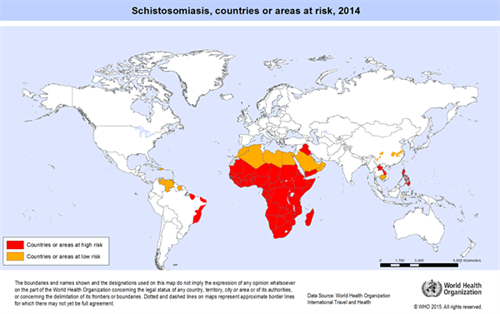Schistosomiasis (Bilharzia)
Introduction
Schistosomiasis is spread through direct contact with infected water e.g. through swimming. It may not cause symptoms but can lead to chronic illness if undetected and untreated.
Recommendations for Travellers
Infection in travellers is often missed because most infected people don’t have symptoms, but damage can occur years after infection. Because of the potential long term effects of the disease it is recommended that travellers take precautions to prevent infection, rather than rely on treatment.
DOs
- Check prior to travel if you are visiting countries where schistosomiasis occurs.
- Only swim in chlorinated swimming pools or safe sea water in affected areas.
- Check with a reliable source to ensure water facilities (showers, baths etc) at accommodation/recreational facilities are safe (many hotels/facilities draw water directly from nearby lakes, untreated, this water can transmit schistosomiasis).
- Avoid activities in affected regions that may involve direct water contact, this includes paddling, swimming, diving, snorkelling, rafting, canoeing, water sports etc.
- Only drink bottled or boiled water.
- Visit your GP for assessment 8 weeks after return to the UK if you are concerned that you have been exposed, or earlier if you have symptoms. Early treatment stops the risk of long term damage.
DON'T
- Buy treatment for schistosomiasis overseas, this is often sold in resorts and may be counterfeit, taken at the wrong dose or taken too early to cure infection.
- Use insect repellent to prevent infection, there is no evidence that this works and most repellent is water-soluble and so will simply wash off.
- Rely on vigorous towel drying of skin after water contact,there is no evidence to prove that this works.
- Rely on other travellers or locals to inform you if a water source is infected, always try and find out from an official or reliable source.
Overview of Disease
Schistosomiasis is a parasitic worm infection. The adult worms live in the blood vessels around the bladder and bowel. The parasite lives in both humans and fresh water snails. Infected snails release microscopic infective parasites in to the water. These penetrate the skin of humans who have contact with the water. Currents can spread the parasites to areas well away from the contaminated water.
Schistosomiasis occurs in fresh water lakes, ponds, rivers and streams in Africa, South America and parts of the Middle and Far East, particularly Lake Malawi, Lake Victoria and the Nile river.
This map below has been reproduced with permission of and acknowledgement to WHO (World Health Organisation). A full sized version of this map can be accessed by clicking on the map.
The Illness
Itchy skin can develop where parasites enter the skin, but usually this is not noticed.
Sometimes, three to twelve weeks after water contact, fever, diarrhoea, cough or a rash occur as the parasites move around the body, this is acute schistosomiasis.
The adult worms are 0.5-2 cm long and live for an average of 2 - 8 years. The female worms produce microscopic eggs that are passed out of the body in urine and bowel motions.It is the eggs that can cause long term symptoms.Most travellers during this time have no symptoms, but it can cause:
- blood in the urine or pain passing urine
- change in the bowel habit and/or blood in the bowel motions
- tummy/pelvic pain or
- genital lumps/bumps
Years later, long standing disease can lead to damage of the bladder, kidneys, bowel, liver and genital tract.
Treatment
Oral medication called praziquantel can cure the infection.
If you have had contact with fresh water in countries where schistosomiasis occurs, you should:
- attend your GP no sooner than 8 weeks after exposure even if you have no symptoms:
- the infection cannot be diagnosed earlier if you have no symptoms
- your GP will send a blood test to check for exposure to the parasite
- if it is positive, you will be referred to an Infectious Diseases clinic for further tests and treatment
- attend your GP on return if you have any symptoms of schistosomiasis:
- acute schistosomisis can be hard to diagnose, and you may be referred to a local Infectious Diseases clinic for tests
- schistosomiasis is diagnosed by a blood test taken no sooner than 8 weeks after exposure
- if it is positive, you will be referred to an Infectious Diseases clinic for further tests and treatment


